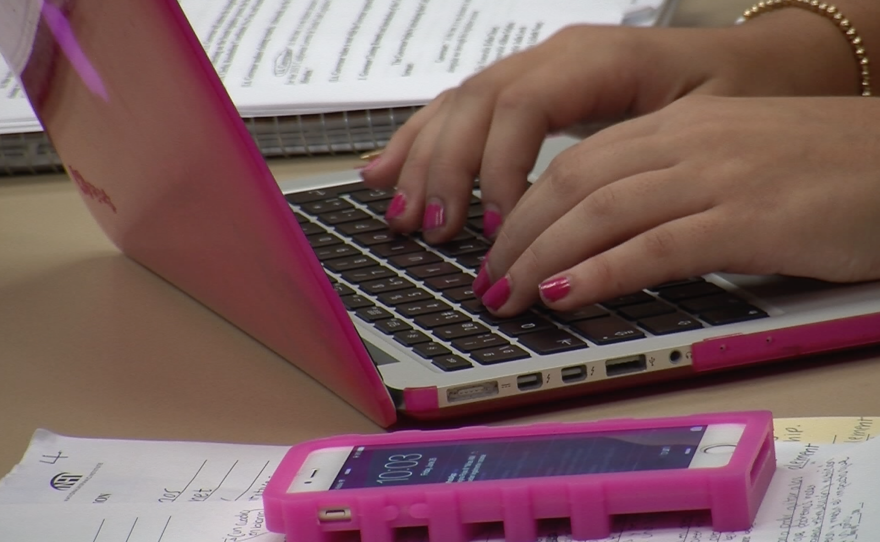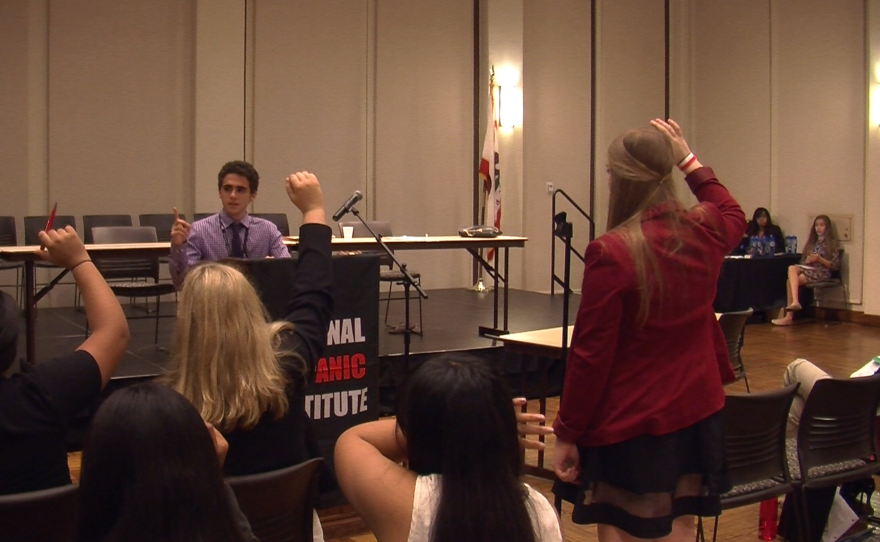Seventeen-year-old Renata Del Riego, born in Mexico City, is a student at High Tech High Chula Vista.
“I am a Supreme Court justice,” she said, wearing black robes, fuchsia-pink stiletto heels and thick-rimmed leopard-print glasses.
She wanted to be a fashion designer as a little girl. Now, she’s interested in human rights.
“I think living at the border definitely impacted the route that I want to take, because I see how families are separated,” Del Riego said.
At the week-long Lorenzo de Zavala Youth Legislative Session held at the University of San Diego at the end of June, she was one of more than 100 students from the U.S. and Mexico debating mock proposals on Hispanic issues. The National Hispanic Institute started the program with the aim of training the Latino leaders of the future. Students must have a 3.2 GPA or higher to participate.
The border blurs in these bi-national, bilingual proceedings. Students debate their proposals in either language.
“Te puedo decir en español?” a fellow Supreme Court justice asked Del Riego.
“Sure, tell me in Spanish,” she responded.
Mexican and U.S. officials have been calling for increased cross-border collaboration, and in these sessions, it’s happening. The teenagers discussed problems like high school dropout rates and unemployment among Latinos on either side of the border, trying to get proposals passed in a mock Senate, House of Representatives and Supreme Court.
Del Riego wrote a proposal to create a permanent border meeting point where deportees in Mexico can hug their relatives in the U.S. without a fence dividing them. The proposal was not passed because it was deemed unrealistic. Earlier this year, a steel border fence door at Border Field State Park was opened for the second time in history in an event organized by the nonprofit Border Angels, but families were allowed to embrace for only two minutes.
In order to pass, proposals had to focus on leveraging existing assets of Latino communities, such as strong family values, rather than on fixing a problem. Students also had to demonstrate that their proposals could be implemented within a year.
“So what we want is to get the good things of the Latino community and from there on build something,” said Lucia Regina Reyes Gonzalez, 16, who came to San Diego from Monterrey, Mexico.
At the beginning of the week-long legislative session, Reyes ran for and was elected lieutenant governor. She made sure Senate proceedings ran smoothly.
“Decorum,” she said, tapping her gavel against her desk.

Reyes was relaxed and authoritative, typing away at her magenta-pink MacBook with matching nails.
“Before I came to this program, I couldn’t stand in front of an audience,” she said. “I would shake. My voice would shake. I would become all red.”
She said the mock electoral speeches at the beginning of the program changed that.
“All of these amazing people gave me the confidence that I needed,” she said.
Successful proposals included one that called for a social media campaign to publicize the strengths of Latino communities; another that called for teacher-to-teacher and student-to-teacher collaborative training within Latin American schools; and another that established higher education scholarships for older Hispanics who demonstrate positive values and want to return to school. Topics ranged from family and health to economy and women’s rights.
Danny Jalate is a 16-year-old Mexican-American student at the King-Chavez Community High School in downtown San Diego. For the week of the program, he was also a senator.
“It’s been amazing. Coming in I was a little nervous and scared, but, that’s the point,” he said.
Jalate, who wore a spotted black tie and a faint mustache on his upper lip, said he isn’t interested in becoming a politician. He wants to become a probation officer, a psychiatrist or an airplane pilot. He said the program has proved useful because it has helped him progress in his social skills.
“It’s helping me be more friendly,” he said, raising an eyebrow.

Over at the House of Representatives, 16-year-old Diego Sosa Fundora had been elected Speaker of the House.
He was born in Cuba and attends a high school in Chicago. Sosa said he dreams of creating an organization to promote Latino leadership in math and science.
“We’re becoming such a big population of the U.S. that it has to be acknowledged, and we need leaders and people to make sure that Latinos grow and make sure that Latinos build off of their strong points and be even greater than they already are.”
He said he felt the program had improved his leadership skills.
Olivia Travieso, operations director for the California legislative session, said the goal of the program is to cultivate those leadership skills in students interested in Hispanic issues. She said non-Hispanic students can participate in the program as well.
"We feel that any leader regardless of their race or ethnicity is going to need to have a deep understanding of Latino identity and the issues facing the Latino community if they're going to be an effective leader," she said.
Seventeen-year-old Citlalli Toscano pulled back her long, sleek auburn hair as she shuffled through papers at the House of Representatives. She was from Guadalajara, Mexico.
“I’m the clerk so I’m basically the secretary. And what I have to do is keep track of the proposals that pass and the ones that don’t,” she said.
Toscano said the program made her realize the importance of collaboration and teamwork on Latino issues.
“What the program tries to teach us is that we’re a very strong community and that we need to reinforce that,” she said.






